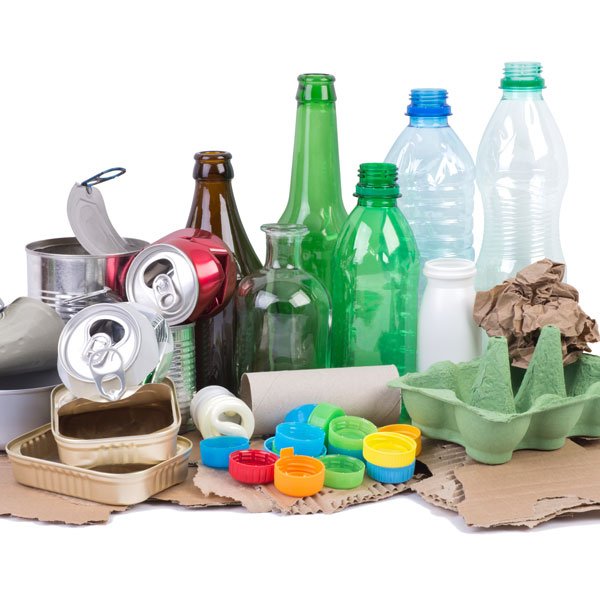Recycling, should I even bring it up?
Do you recycle?
When something is recycled that means that it is averted from the landfill (or the ocean) and turned into “new” products i.e., it is a way to reduce waste.
Recycling is a beautiful thing and oh-so-circular—when successful. Natural resources are saved (minerals, trees, water, etc.), demand is reduced for raw materials (oil, aluminum, pulp) which then inherently reduces pollution (emissions and waste) created by sourcing those materials, the amount of waste sent to landfills and incinerators is minimized, and jobs are created. All positives!
But recycling… what is actually recyclable, is very specific to where you live and your municipality’s waste management. It is not done in a one size fits all way across the U.S., let alone the world. For instance, something totally recyclable in Portland, Oregon, may not be in rural Colorado due to regional infrastructure and resources.
Does your household currently recycle? Most Americans do NOT recycle all they can. Shocker right? Not really... The importance of recycling, what is actually recyclable and what is not, along with incentives are not communicated that well to the general public. But there are great tools out there currently that help you understand your local recycling rules, like this one called Be Recycled, simply enter your zip code and they’ll let you know. It is a responsible move to look up your local recycling rules, there are more tools to help you in 'Save Resources' below.
What is (ACTUALLY) recyclable?
Make sure what you are tossing in the recycle bin is ACTUALLY recyclable. It’s a dirty myth that you should just send it all to the recycler, even if you’re not sure if it is recyclable and “they’ll” sort it for you. But the reality is that this creates a huge fuss at the recycling facility. Every non-recyclable item that gets sent to recycle must be removed by hand by trained staff or mechanically sorted so they don’t contaminate the high-value recyclables or jam the machines. Then it has to get sent to the dump. The best practice, and we know it sounds backward, but if you are not 100% sure something is recyclable, throw it in the garbage. That way you're not having your garbage make two stops instead of one.
In a nutshell here is a list of what is actually recyclable in your residential recycling bin.
Paper (not covered in food or lined with plastic)
Plastics 1-7 (but you need to check your local waste management for what plastic numbers are still accepted post-2019 recycling apocalypse)
Aluminum (can’t go wrong here just wash it out)
Glass (same as aluminum)
Other things like electronics, batteries, copper wires are still recyclable, you just have to do it in a specific way. Remember you can’t just throw everything in the bin and hope for the best.
What makes for successful household recycling?
Here are the top three rules to remember when recycling:
Clean it before you toss it in the bin but it doesn’t have to be perfect, it just can’t have a half-inch film of moldy marinara on it when it arrives at the recycling facility. Remember it takes people and/or machines to then clean that material before it can be recycled when you could have just done it before it got all nasty.
Keep food and liquid out of your recycling, otherwise, it contaminates materials making them UN-recyclable.
No plastic film. You know the plastic wrap that most things seem to be wrapped in? That saran-wrap-like material? Most of those types of plastics are NOT recyclable because they are likely to jam recycling machines. Additionally, do not bag your recycling in a plastic bag… we’re not playing Russian nesting dolls here.
Pro-tip: put a recycle bin next to every trash bin in your house OR in the kitchen and the bathroom(s) OR one bin for upstairs and one for downstairs. This way you will make it easy on yourself and the rest of the household to ACTUALLY recycle most or ALL of your household’s recyclables. It has been proven that the more members in a household that recycle, the better the quality of the materials they recycle. What about the milk carton? Is that recyclable? ...Are you sure??? Short answer: Yes, but not every recycling facility is equipped to recycle them—Oh the tangled webs we weave. This again points out the importance of taking 10 minutes to make sure you are familiar with your local recycling rules.
Will you save money by recycling?
Short answer: depends. If your municipal waste management charges you more to have bigger trash bins and the recycle bin of any size is included, then yes. For example, if you live in Portland, Oregon, you could be saving anywhere from $5-$20 PER MONTH, possibly $240 buckaroos a year by reducing the size of your trash bin! Check your city's residential garbage rates to find out if you could be a big saver!
2019 China Recycling Import Ban
The U.S. is really bad at recycling. This first materials recovery facility (MRF) was established in the U.S. in 1897. That was a (really) long time ago… so why are we still so bad at recycling? This answer is really complex. So it’s been simplified in a haiku poem:
It is expensive
We relied on exporting
Bad infrastructure
And since China’s 2019 halt on importing ANY of our recyclables, where most of our plastics were being sent to be recycled previously, things have taken a big downturn. We currently have a lack of proper national infrastructure to deal with our own recycling.
In the end, we people living our best lives in our homes can and should do our best to recycle all we can. If they (municipal waste companies) collect enough of it they will need to figure out a solution for how to responsibly deal with it!






